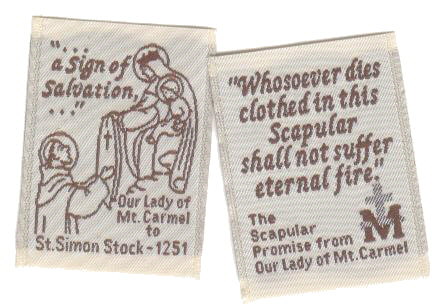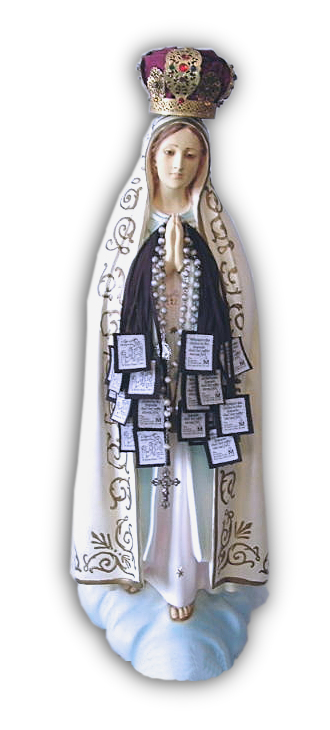|
Mount
Carmel, located in the Holy Land, has traditionally been celebrated
as the dwelling place of Elias, the great Old Testament prophet, and
his disciples. Elias was the prophet who defended the true God of
Israel against the prophets of the false god Baal. The prophets of
Baal had convinced many of the Hebrews to abandon the worship of the
true God in order to embrace the religion and worship of Baal. Elias
confronted them personally in order to prove that the God of Israel
is the only true God.
The account of this event is given thus in 3 Kings 18: 21-40
And Elias coming to all the people,
said, "How long do you halt between two sides? If the Lord be God,
follow him: but if Baal, then follow him." And the people did not
answer him a word. And Elias said again to the people, "I only remain
a prophet of the Lord: but the prophets of Baal are four hundred and
fifty men. Let two bullocks be given us, and let them choose one
bullock for themselves, and cut it in pieces and lay it upon the
wood, but put no fire under: and I will dress the other bullock, and
lay it on the wood, and put no fire under it. Call ye on the names
of your gods, and I will call on the name of my Lord: and the God
that shall answer by fire, let him be God." And all the people
answering said, "A very good proposal."
Then Elias said to the prophets of
Baal, "Choose you one bullock and dress it first, because you are
many: and call on the names of your gods, but put no fire under." And
they took the bullock which he gave them, and dressed it: and they
called on the name of Baal from morning even till noon, saying, "O
Baal, hear us." But there was no voice, nor any that answered: and
they leaped over the altar that they had made. And when it was now
noon, Elias jested at them, saying, "Cry with a louder voice: for he
is a God, and perhaps he is talking, or is in an inn, or on a
journey, or perhaps he is asleep, and must be awaked." So they cried
with a loud voice, and cut themselves after their manner with knives
and lancets, till they were all covered with blood.
And after midday was past, and
while they were prophesying, the time was come of offering
sacrifice, and there was no voice heard, nor did any one answer, nor
regard them as they prayed: Elias said to all the people, "Come ye
unto me." And the people coming near unto him, he repaired the altar
of the Lord, that was broken down ... And when it was now time to
offer the holocaust, Elias the prophet came near and said, "O Lord
God of Abraham, and Isaac, and Israel, show this day that thou art
the God of Israel, and I thy servant, and that according to thy
commandment I have done all these things. Hear me, O Lord, hear me:
that this people may learn, that thou art the Lord God, and that
thou has turned their heart again." Then the fire of the Lord fell,
and consumed the holocaust, and the wood, and the dust, and licked
up the water that was in the trench. And when all the people saw
this, they fell on their faces, and they said, "The Lord he is God,
the Lord he is God." And Elias said to them, "Take the prophets of
Baal, and let not one of them escape." And when they had taken them,
Elias brought them down to the torrent Cison, and killed them there.
Tradition teaches that when our
Lord began His public ministry, the Carmelites, i.e., the
descendants of the prophets Elias and his disciples, accepted the
Gospel at once and embraced the Christian faith. The Roman Breviary,
in the Office of July 16th, feast of Our Lady of Mount
Carmel, says that they were the first who carried veneration for the
Blessed Virgin to the extent of erecting a chapel in her honor,
where they joined in singing her praises. We may, therefore, trace
the origin of the title of our Lady of Mount Carmel, as well as the
famous Order of the Carmelites, back to this remote period of
Christian antiquity.
Many of the holy Carmelites
settled in England about the middle of the 13th century.
And it was in England, and the Monastery of Cambridge, that the
memorable event took place when gave rise to the devotion of the
Brown Scapular of Mount Carmel. It was on Sunday, July 16th,
1251, while Saint Simon Stock, superior general of the Order of
Carmelites was imploring with extraordinary fervor the protection of
the most Holy Virgin against the violent persecution being waged
against his Order, that our Blessed Mother appeared to him, holding
in her hand the brown scapular, and addressed to him this gracious words:
"Receive, my dear son, this scapular of your Order, in token of the
privilege which I have obtained for you and for the children of
Carmel; he who at his death shall be found clothed in this habit
shall be preserved from the eternal flames; it is a sign of
salvation, a safeguard in time of danger, and a pledge of special
protection."
The learned and illustrious
Pontiff, Benedict XIV, in his Treatise on the Feasts of the
Blessed Virgin (II, Book, c.vi.) declares that he fully believes
in the vision of Saint Simon, as well as in the revelation by which,
half a century later, the Holy Virgin promised Pope John XXII "that
she would rescue from Purgatory as quickly as possible, and
especially on the first Saturday after their decease, the members of
the Confraternity of the Brown Scapular."
|




